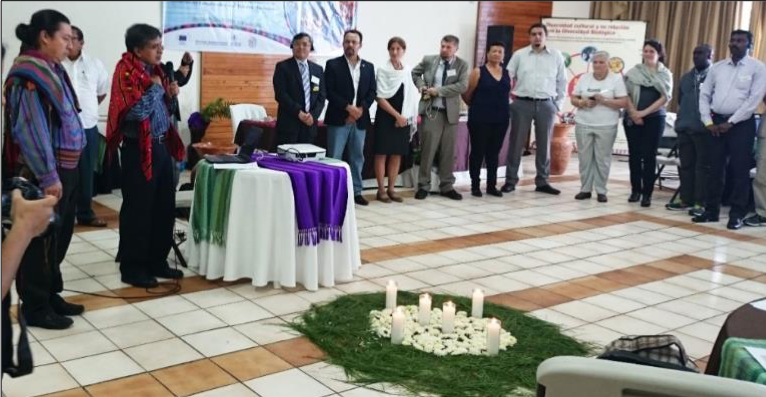First published on 08/29/2015, and last updated on 03/29/2018
By: Carmen Miranda L., ICCA Consortium Coordinator for the Amazon Region
Panajachel, on the shores of the ancient sacred Mayan Atitlan Lake in Guatemala, harboured the Dialogue Workshop on Assessment of Collective Action in Biodiversity Conservation, which took place from 11-13 June 2015. The workshop was organized by SwedBio from the Stockholm Resilience Centre. Seventy-eight participants from over thirty countries were present.
The purpose of this meeting was to share and discuss various methodologies and conceptual frameworks to document and evaluate the contribution of collective action to take into account the needs, values and perspectives, of different actors including indigenous people and local communities.
Invited by the Secretariat of the CBD, Felipe Gomez, member of the Steering Committee and Carmen Miranda L., Coordinator for the Amazon Region represented the ICCA Consortium in this workshop.
The experience of the Consortium was presented in Session IV, a panel dialogue on methods for measuring and aggregating data related to collective action with a bottom-up perspective.
Carmen Miranda explained briefly the methods and tools used by the ICCA Consortium to document and visualize ICCAs and measure their contribution to conservation. She explained that ICCAs are found everywhere in the world, are extremely diverse, and are called by a multiplicity of names. Yet, they have three main, common characteristics:
- A strong relationship between a community and its territory (e.g. livelihood, history, culture, spiritual needs);
- The community possesses a governing institution in place—capable of exercising de facto (if not de jure) decision making and implementing decisions on how to manage the territory;
- The community decisions and practices lead to nature conservation, biodiversity and the associated ecological functions and cultural values.
Methodologies to visualize ICCA contributions involved various steps. Many grassroots discussions on ICCAs were held, trying to find processes and indicators to allow the community self-evaluation of these three characteristics. These processes and indicators were initially tested in 2007 in twenty countries together with the completion of regional analyses. Since then, more processes have been used, most of which include visual tools for mapping ICCAs, like 3D mapping and Participatory Geographic Information Systems (PGIS).
Carmen spoke about tools to assess ICCAs resilience and security. The recording tool is a form, used as part of community discussions, to measure internal and external factors interfering with the three defining ICCA characteristics, as well as external factors. The process has been tested on several continents and in different languages. Participatory video and photo stories have also been produced on threats to ICCAs and community responses to these. A number of steps are involved in these processes including introduction meetings, visits, discussions, community engagement in writing scripts, taking photos/videos, importing traditional music, recording voice over, adding the photo or video story, more discussions, developing dissemination and advocacy strategy. Examples of photo and video stories are available from the ICCA Consortium website
Carmen further mentioned interactive radio programmes on ICCAs in local languages, and the fact that the Consortium has developed a toolkit for environmental monitoring and threats assessment. This toolkit mostly relates to the impacts of extractive industries, causing loss of knowledge, and weakening of ICCAs. Bio-cultural community protocols are also part of this work.
The ICCA Consortium has also helped to develop and improve the ICCA Registry, established in 2009, and which is now in the process of being fully integrated to the protected planet database managed by UNEP-WCMC. ICCA communities can send their information via a simple peer review process within national ICCA networks/ coalitions/ federations – as appropriate – with the advice/ facilitation of the ICCA Consortium and on the basis of some standard forms. The communities are the owners of the submitted information, and decide whether the information is visible or hidden, and may withdraw it at any time.
Lessons learned, as shared by Carmen were, among others, that appropriate methods and tools help communities to better manage and govern their territories (land, water and natural resources) and to strengthen the history, culture, and self-determination processes. Appropriate methods and tools can also better connect different communities and strengthen coordinated actions with allies.
The results of this workshop will contribute to the treatment of subjects that will be addressed at the Biodiversity Convention in December 2016, in Mexico.
The presentation is available on the website of the CBD. The details of the presentations and the conclusions of this event will be available soon on the same page.
